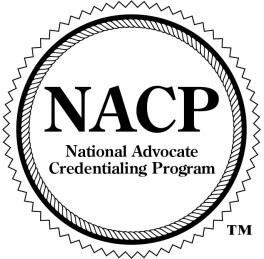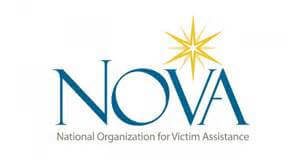Victim Advocacy Certificate Course – Online
In honor of those who have fallen victim to crime. In memory of those whose lives have ended too soon.
Dedicated to those who work to make the world a better place.
About This Course
This intensive online program is designed to train and qualify students to provide assistance to crime victims. The course provides an overview of criminal procedure and discusses the devastating effects crime can have on its victims.


Successful graduates of our training program will be eligible at minimum for the NACP Provisional Credential and possibly for the Basic, Intermediate or Advanced Credential based upon their experience in the field. Please refer to the NACP link for additional information: https://www.thenacp.org/pre-approved-trainings-by-location/
Course Objectives
- Define the rights and responsibilities of a victim advocate
- Summarize the relevant legislation regarding victim advocacy and background of victim advocacy
- Summarize the American legal system and the American system of government
- Discuss both the civil and criminal litigation processes
- Discuss how crime affects victims
- Identify the elements of the grief process and PTSD
- Explain how to work with the victim’s family and the media definitions of racism, sexism, and heterosexism
- Define classism, ageism, and ableism
- Demonstrate how to respond to victims of hate crimes
- Explain guidelines for death notification and for providing support after death notification
- Identify victim advocacy skills for working with surviving family members of a homicide victim
- Identify suicide behavioral distress signals
- Demonstrate techniques for assisting suicidal persons and tools for suicide prevention
- Identify patterns of domestic violence
- List characteristics of abusers and victims
- Explain how to counsel victims of domestic violence
- Discuss how to recognize signs of child abuse
- Identify common Myths Regarding Rape
- Describe the effects of sexual assault and rape
- Demonstrate how to respond to victims of sexual assault and rape
- Identify the elements of sexual abuse, child neglect, physical abuse, and emotional abuse
- Identify techniques for intervention and support in child abuse situations
Expectations
This is an accelerated course. You will be expected to spend an average of at least 8 hours per week reading and completing writing assignments. Please note that extensions will not be granted for this online course. This course is the equivalent of at least 45 clock hours of study. 70% is the minimum passing score on all tests and assignments for this course.
Course Books
There are no required texts for this topic.
Lesson Topics:
Lesson One: Introduction Victim Advocacy and Legislation regarding Victim Rights
Lesson Two: Introduction to the Legal Process and Effects of Victimization on the Victim
Lesson Three: Victim Advocate Skills and “ISMs” (a look at bias in victim advocacy)
Lesson Four: Assault, Battery, and Robbery and Homicide & Suicide
Lesson Five: Domestic Violence
Lesson Six: Sexual Assault/Rape and Child Abuse
Course Wrap-Up and Job Hunting Techniques
Assignments
Writing Assignments:
For each lesson you will submit a 50-point short answer/essay assignment covering the topics in that lesson’s reading.
For lesson three you will submit a 20-point Victim Advocacy Analysis.
Exams:
You will complete two exams. Each is worth 100 points. The Midterm exam is to be submitted with your Lesson Three Assignments; the Final exam is to be submitted with your Lesson Six Assignments.
Bulletin Board Assignments:
You will also post your responses to six class participation assignments. These assignments are referred to as Bulletin Board Submissions and will be submitted by either selecting Bulletin Board Submission from within the lesson material, or by selecting ‘Forums’ under Activities on the course home page.
All lesson objectives, assignments, and tests can be found in the Lesson Materials.
Grading
Your grade will be based on your completion of six writing assignment assignments, two exams, and class participation/Bulletin Board Submissions. The exams and writing assignments can be accessed from within the lesson material, or by selecting ‘Assignments’ under Activities. You will have the opportunity to engage in “class participation” by using the Bulletin Board tool to respond to the bulletin board assignments throughout the course. Also, participating in the bulletin board assignments will enhance your understanding of the reading material.
Your final grade will be figured as follows:
- The six writing assignments are worth 50 points each and comprise 40% of your grade.
- The two exams are worth 100 points and comprise 40% of your grade.
- Your participation in class participation assignments comprises 20% of your grade.
Every assignment must be completed with 70% or better in order to pass the course.
Withdrawal Policy
Students may drop the course with a full tuition refund less a $50 non-refundable administrative fee if written notice is sent to CLS by BARBRI by email [email protected] by the Wednesday before class begins. Students may drop the course with a 50% tuition refund if written notice is sent to CLS by BARBRI by email [email protected] anytime from the Thursday before the course begins until the first Thursday of class. After the first Thursday of class no refunds will be issued.
Please NOTE: If you registered for a CLS course directly with the college or university, you are subject to the school’s refund/drop policies.
Acknowledgment
CLS by BARBRI gratefully acknowledges contributions to the development of this course: Patty Mosher, Victim Assistance Program Director in Douglas County, Colorado, for providing access to her program and research materials; Leigh Builder, Victim Assistance Advocate in Atlanta, Georgia, for providing national information and research materials; Joseph Arseneau, former police officer and educational researcher, for providing research development and contacts as well as initial inspiration for the certificate program format; Annalisa Philbin, J.D. for her legal expertise; and Dr. Alison Hatch, former Director of Continuing Education at CLS by BARBRI, and former Legal Victim Assistant in Boulder Colorado, for editing and researching.